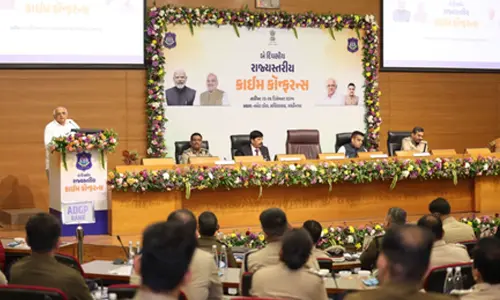'There is urgent need to flood the world with positive energy'

Anantha Duraiappah
What we hear from the news, social media and other media forums are events of disasters, conflicts, wars and violence. These events can have negative psychological impacts on us. Why not celebrate the good that is being done across the world?
What we hear from the news, social media and other media forums are events of disasters, conflicts, wars and violence. These events can have negative psychological impacts on us. Why not celebrate the good that is being done across the world?
We hardly hear of the good except when there are special events or while we are celebrating special days. Why don't we get doses of these good deeds at the same rate that we get news of disasters? This urgent need to flood the world with 'positive' energy led to the '#KindnessMatters', a co-publication of UNESCO MGIEP (Mahatma Gandhi Institute for Education for Peace And Sustainable Development) and Penguin Random House, says the Institute's Director, Anantha Duraiappah, on its release on World Kindness Day (November 13).
"The book presents 50 small but heroic and impactful acts of kindness from around the world. The idea of presenting these transformative stories is to inspire many more people (young and old) globally, to practice kindness in their everyday lives towards developing more peaceful and sustainable homes, classrooms, workplaces, communities, and the world," Duraiappah told IANS in an interview.
The book, he said, has been inspired by UNESCO MGIEP's global #KindnessMatters campaign launched in 2018 -- to collect stories of young people carrying out acts of kindness to create a positive culture of compassion.
"So far, we have collected over one million acts of kindness -- focused on K3 -- kindness for self, kindness for others and kindness for nature," he added. Detailing the process of selecting the 50 stories in the book, he said a small team from UNESCO MGIEP and Penguin conducted reviews, surveys, and reached out to thousands of individuals and hundreds of kindness organisations worldwide to submit inspirational stories.
"A simple selection criteria was established based on scale, duration, or impact and diversity. Eventually, we arrived at 50 inspiring, and impactful stories, which are just a tip of the kindness iceberg," Duraiappah explained.
A common thread runs through these stories, of "the selfless, compassionate and impactful acts of kindness that people have carried out for self, for others or for nature, again, in line with the underlying theme of the #Kindness Matters K3 campaign. The book brings out such stories of human interest that are a testament to the positive and sustainable change people are able to create", he elaborated.
What prompted the observance of World Kindness Day and what has been the experience so far -- particularly during the pandemic? How can the concept be taken forward in the 'new normal' of the post pandemic world?
World Kindness Day on 13 November was established in 1998 by the World Kindness Movement and is now celebrated by hundreds of thousands of individuals and organisations worldwide.
This year, UNESCO MGIEP is supporting the World Kindness Day by highlighting transformative actions and events of people and organisations through a dedicated website.
"In the past year and a half, we have experienced devastation caused by the Covid-19 pandemic. Many have lost loved ones or been separated from them during the pandemic. Even in its aftermath, the pandemic will leave a lasting effect that will take years to recover. However, we have also received an outpouring of kindness and heartening actions/stories of people supporting each other to overcome the challenges that humanity faces.
"What we find is that during these tough times, kindness is the binding force that connects us and will continue to do so as we grapple with many more such global issues," Duraiappah said.
Noting that the quest to create ripple effects of kindness globally is backed by science and evidence, he added: "Neuro-scientific studies have shown that altruistic, kind behaviour engages brain networks associated with reward processes. We hope to capitalize on this fundamental biological need to build a new way to drive global positive change irrespective of the context we find ourselves in. I would encourage everyone to be a part of the kindness force."
How did UNESCO MGIEP come about? "In 2009, the UNESCO General Conference decided to set up an institute focused on education for peace and sustainable development in the vast and rapidly growing Asia-Pacific region. The Institute was launched in 2012 and initially a two-member team operated out of the UNESCO office in New Delhi. Over time, the team has expanded to over 35 members and works out of its independent albeit temporary office in central Delhi," Duraiappah said. UNESCO MGIEP focuses on achieving the UN Sustainable Development Goal 4.7 towards education for building peaceful and sustainable societies across the world by developing programmes and products that promote social and emotional learning, innovate digital pedagogies and empower the youth, he said.
UNESCO MGIEP's Social Emotional Learning (SEL) interventions draw on the science of learning and the aim to build intellectual and emotional intelligence among learners through innovative pedagogies, Duraiappah concluded.















